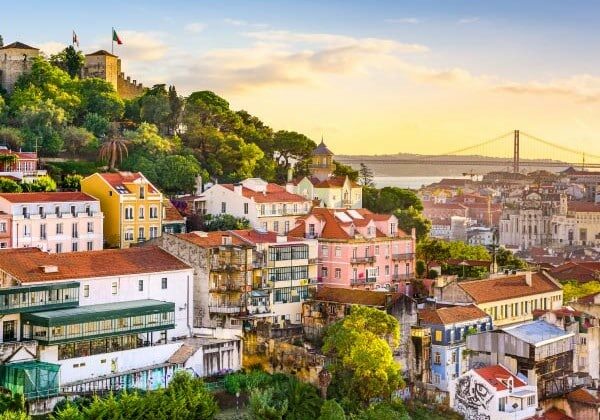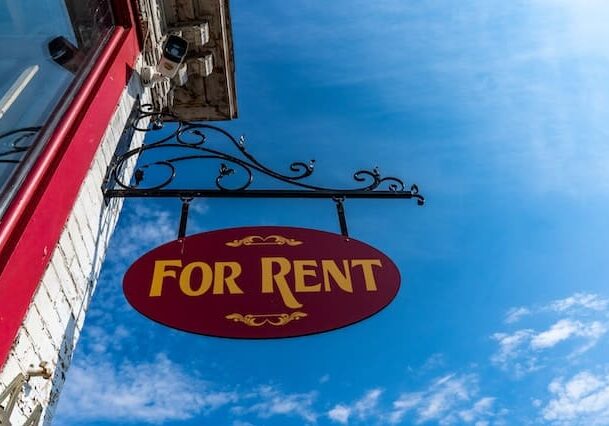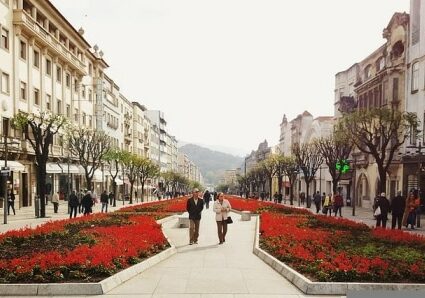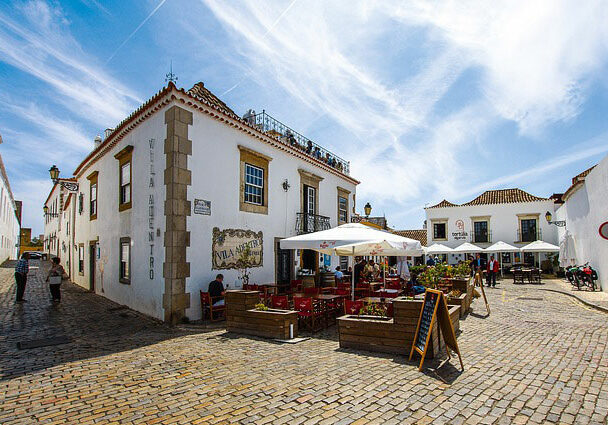Many people will first consider renting in Portugal when moving to the Iberian Peninsula. This is a smart move if you’re unfamiliar with the area or want to set up a base before exploring the country. Whether a furnished apartment for a digital nomad or a secluded house in the country for long-stay residents, Portugal has a wide range of rental options, perfect for people who want to weigh their options.
This guide will provide you with essential information about the different types of rental properties available, the intricacies of renting in Portugal, and how to navigate the rental process smoothly.
You’ll also learn more about:
Renting in Portugal

Renting an apartment is the most common choice for expats seeking accommodation in Portugal, particularly in vibrant cities like Lisbon and Porto.
These apartments typically range from one (T1) to four bedrooms (T4) and include a kitchen, living room, and one or more bathrooms. Many expat rentals come furnished, especially those aimed at students or short-term stays, but it is more common to find unfurnished properties.
For those who prefer more floor space and increased privacy, renting a house in Portugal is also an option – especially if you explore the outer areas and suburbs. Villas and country houses are less commonly available for long-term rent and are more often found as short-term or holiday rentals. This is due to their higher cost and greater demand among property buyers.
Finding a Place to Rent in Portugal
The renting process might seem daunting, especially if it’s your first time looking for a rental. Where do you start, and what do you need? Thankfully, there are plenty of resources to help you find the right spot, whether you’re aiming for a city apartment or a countryside house. You have several options, whether working with a local real estate agent or using online platforms to rent privately through the property owner.
Property finder
For expats unfamiliar with Portugal’s diverse regions, hiring a property finder can be a game-changer. These professionals offer local insights and hands-on assistance, streamlining your rental search and helping you avoid costly mistakes. They filter through listings on your behalf, narrowing it down to quality homes that suit your budget—saving you both time and frustration. More importantly, they serve as a frontline defense against fraudulent listings and rental scams.
Our recommendations are BE Global Properties and Goldcrest Portugal Real Estate.
Real estate agency
It’s also a good idea to check the rental listings of local and national real estate agencies. They will have verified properties available, and it’s often much easier to go through the process. However, when you find a property you are interested in, act quickly, as the rental market can be very competitive. Some of the most popular real estate agencies in Portugal are:
- ReMax
- Century21
- ERA Imobiliária
- Engel & Völkers
- Fine & Country
Online platforms
A good resource for finding rentals in Portugal is by searching the many online platforms. Portugal has plenty of websites dedicated to finding your perfect home, and everything is usually taken care of online. However, as with anything online, you must exercise caution and verify the authenticity of the listing and advertiser when possible. Many real estate agents also list their rentals on these online platforms.
Here are some reliable sites to start your search for properties in Portugal:
- Idealista
- Imovirtual
- iad Portugal
- Spotahome
- Custojusto
- Kyero
- Airbnb
- Casa Sapo
Cost of Renting in Portugal
Rental prices in Portugal can vary significantly based on location, whether in Lisbon or a quieter rural area. For example, in Lisbon and Porto, house rents have increased by over 40% in the past five years, according to INE data.
The average rental price in Portugal is €15 per square meter, marking a 30% rise compared to July 2022. Lisbon, in particular, has the highest rental price, exceeding €18 per square meter.
Despite these increases, rent in Portugal remains lower than in many European countries and the United States. Many expats find it helpful to work with a real estate agent to navigate the process of entering into a rental contract or specific rental agreement.
The rental price often does not include utilities like gas, electricity, water, and internet, which are usually paid separately. Some listings might include these expenses; look for “despesas incluídas” if you prefer an all-inclusive rent. Additionally, consider checking the price per square meter to get a sense of value.
Apartment Type | Rent per month | ||||
Lisbon | Porto | Braga | Algarve | ||
One bedroom in City Center | €1,412.82 | €1,042.86 | €787.5 | €1000 | |
One bedroom Outside Center | €1,008.45 | €849.7 | €590 | €850 | |
Three bedrooms in City Center | €2,642.11 | €1,854.45 | €1,237.5 | €2,340.36 | |
Three bedrooms Outside Center | €1,679.49 | €1,370.93 | €966.67 | €1,254.76 | |
Additional Rental Costs in Portugal
When renting in Portugal, it’s essential to consider all potential costs beyond just the monthly rent.
Deposit and Security Deposit
In Portugal, you’ll typically need to pay a rental deposit, often equivalent to three months’ rent. This deposit secures your lease and is usually refundable at the end of your tenancy, assuming no issues arise. Landlords may also require a security deposit to cover potential damages during your stay.
Agency and administration fees
You’ll be responsible for the agency fees if you use an agency to find your rental. These fees are separate from administration fees, which the tenant does not typically cover unless you hire the agency for additional services. When using an agency, ensure you understand all costs involved.
Utility costs and vacation rentals
For long-term rentals, utilities like gas, electricity, and water are usually not included in the rent and must be paid separately. However, if you opt for a vacation rental, the cost of your stay generally includes all utilities. The total average cost is approximately €100 per month.
Rent directly and help with costs
If you choose to rent directly from a private landlord, be prepared to follow a similar process as outlined above, including providing the required documents and paying a deposit. Portugal offers various forms of support to help with rental expenses. For instance, the Porta-65 Jovem initiative assists individuals aged 18 to 35. Additionally, subsidies are available for retirees and the unemployed, though you must register with the local employment center (Centro de Emprego) to qualify.
By understanding these aspects of renting in Portugal, including the various costs and support available, you can better navigate the rental market and make informed decisions about your property.
Steps for Renting Property in Portugal
With the right information, renting as an expat in Portugal will help you navigate the process smoothly. Here’s a step-by-step guide to help you understand what to expect when renting a property.
Real estate agency

After signing the lease agreement, you’ll typically need to pay an advance on the rent, known as renda antecipada, which is usually around three months’ rent. Also, landlords may require a security deposit (caução), an extra financial commitment.
Required documents
- Valid ID such as a residency card or passport
- NIF (Número de Identificação Fiscal)
- Proof of income
- Proof of employment
- Portuguese bank account details, if requested
- Guarantor, if requested
Renting directly through a private landlord
If you rent directly from a private landlord in Portugal, you’ll follow a similar process. You’ll still need to provide the same documents, sign the rental agreement, and pay a deposit upfront. Be aware that some landlords may not speak English, which could complicate communication, especially if issues arise.
Do I need a guarantor for renting in Portugal?
Also known as “fiador” in Portuguese, a guarantor is a person who legally assumes responsibility for your rent payment in case you’re unable to pay it. Please note that they must be Portuguese citizens, working, and over 18.
While a guarantor is not mandatory for the validation of a rental contract, most landlords require one. As an alternative, landlords can request that you pay a few months’ rent upfront (usually three).
This type of rent payment replaces the guarantor in some cases, and it’s called “Renda anticipate” in Portuguese.
Popular Places to Rent Accommodation in Portugal
Popular choices for expats are metropolitan hubs like Lisbon and Porto or the southern allure of the Algarve. Each location has its advantages, and below, we’ll give you a quick overview of four of the most popular areas to rent in Portugal.
Lisbon

Expect to pay an average rent of €900 and €1,800 per month for a one-bedroom apartment and between €1,400 and €3,500 per month on average for a three-bedroom apartment.
Prices significantly increase if you rent in the city center, which encompasses some of the best neighborhoods in Lisbon.
Porto

While some apartments’ prices are comparable to those in the capital, more economical alternatives can also be found in this charming locale for those looking to rent in Portugal.
The average rent for a one-bedroom apartment in Porto is between €700 and €1,200 per month and between €1,000 to €2,500 per month for a three-bedroom apartment.
Braga

Its historic charm, vibrant culture, and religious landmarks make it a unique and alluring destination for expats looking to rent in Portugal.
Apartment rentals in this stunning northern city are more affordable than in other big cities. You’ll pay between €600 and €850 per month for a one-bedroom apartment and between €850 and €1,450 average rent per month for a three-bedroom apartment.
Algarve

Many apartment rentals in the Algarve are vacation or short-term, but you’ll find long-term rentals for various prices, depending on where in the Algarve you choose to rent.
The average rent for a one-bedroom apartment is between €600 and €1,500 per month, and for a three-bedroom apartment, it is between €1,000 and €3,500 per month.
Social Housing in Portugal
The management of social housing (habitação social) falls under the jurisdiction of the Instituto da Habilitação e da Reabilitação Urbana (IHRU).
Both residents and expats with permanent residency are eligible to seek rental assistance (arrendamento apoiado). This aid targets individuals and families facing substandard living conditions or limited income. An application can be completed online via the Portal da Habitação. The program tailors the rental expenses to align with the candidate’s financial capabilities.
Tenancy Contracts in Portugal

You should find the following details in a standard contract:
- Names and identification of all involved parties
- The rental property’s address
- The rental amount and due date
- Duration of contract
Once the contract is signed, both the landlord and tenant should keep a copy for future reference.
Tenant rights in Portugal
In Portugal, rental contracts automatically renew unless terminated by either party. Tenants must provide at least two months’ notice before vacating a property. While fixture modifications are generally permitted, reviewing the contract or consulting the owner is advisable. In the event of property damage, the landlord can retain the deposit upon lease completion.
Subletting (subarrendar) is typically prohibited unless stipulated in the contract, necessitating landlord permission. Moreover, per Decree-Law no. 47344 article 1062, sub-tenants cannot be charged more than 20 percent of the original contract amount.
Landlord obligations in Portugal
Most landlords give two months’ notice before terminating a contract. Occasionally, landlords must provide a reason for terminating the contract, such as the need to renovate the property or live in it themselves.
If a tenant falls behind on rent for three months, landlords will send them a written notification that the rent is overdue. If this is ineffective, then the eviction procedure (procedimento especial de despejo) can be initiated via the Balcão Nacional do Arrendamento.
Where to go in the event of a dispute
In the rare event that there should be an issue between tenants and landlords, help is at hand. The Associação dos Inquilinos e Condóminos do Norte de Portugal can give guidance and advice if there is a dispute. Those renting in Lisbon can also get help from Centro de Apoio do Novo Regime de Arrendamento Urbano (NRAU).
Portuguese law also protects and guides both parties involved if there are problems. Law no. 13/2019 lists actions that can be implemented in case of a dispute to ensure that anyone in a vulnerable situation is protected. Should you need a lawyer but can’t afford one, legal aid can be called upon through Social Security.
Buying versus renting in Portugal: Which is right for you?
Renting a property in Portugal often offers a simpler, more flexible alternative to buying. The renting process involves minimal paperwork and no mortgage hassle, and many properties come fully furnished, allowing for immediate move-in. This is ideal for those looking to experience Portugal without long-term commitment or for digital nomads and short-term visitors who need a hassle-free setup.
On the other hand, buying property in Portugal can be a great choice if you’re considering making it your permanent home or looking for a solid investment opportunity. Owning real estate can offer stability and potential rental income, making it a valuable asset if you plan to stay long-term or leverage it as part of your investment portfolio.
Renting out Your Property in Portugal
Renting out your property in Portugal can be a lucrative way to generate income. Before you start, ensure you’re licensed for renting in Portugal. Using online platforms can help you advertise and manage bookings efficiently. Consider furnishing and providing essential amenities to enhance your property’s appeal. If you’re uncomfortable managing bookings, rental agreements, and tenant issues, hiring an agent might be a good idea.
For those renting in Portugal, whether short-term to tourists or long-term to residents, here’s what you need to know:
- Agency Fee: If you hire an agent to manage your property, expect to pay an agency fee, usually one to two months’ rent.
- Stamp Duty: You’ll need to pay stamp duty (imposto de selo), typically around 10 percent of the rental value.
- Municipal Property Tax (IMI): This tax ranges from 0.3 percent to 0.8 percent of the property’s assessed value and is due annually.
- Rental Income Tax: You must also pay tax on your rental income, which varies between 10 percent and 28 percent depending on the duration of the rental contract.
The average rent may be higher for properties in expensive areas. Considering these costs can help you better manage your rental property and ensure you stay on top of your financial obligations. Being informed will make the process smoother whether you’re dealing with rental income or the average rent in Portugal.
Renting in Portugal with Pets
Renting with pets in Portugal is feasible but requires some extra steps. The law limits pets to three dogs or four cats, with a maximum of four animals. Exceptions can be made by a municipal veterinarian or health decree.
Finding a pet-friendly property can be tricky as not all landlords or agencies are open to pets. Look specifically for listings that mention they are pet-friendly, as most agencies might not highlight these options.
Due to demand, the average rent for pet-friendly places will be higher. Check for properties within your budget, and be aware that some might have additional costs.
Keep your living space clean and well-behaved to maintain a good relationship with your landlord. Understanding your tenant rights will also help make your rental experience smoother.
Navigating renting with pets in Portugal can be manageable with careful searching, ensuring you and your pets find a suitable home within the average rent range.
Tips for Renters in Portugal
To ensure a smooth and positive experience as a tenant in Portugal, keep these essential tips in mind:
- View the property: Always visit the property and sign the rental contract before making any payments. This helps you understand all terms and see if the property meets your expectations.
- Request an inventory: Ask the landlord for an inventory list. If one isn’t provided, take detailed photos of the property when you move in. This can help resolve disputes and protect your deposit.
- Address repairs: If repairs are needed before you move in, discuss these with the landlord before signing the rental contract. Ensuring everything is in good condition will make your stay more comfortable.
- Clarify fees: Make sure to clarify any additional fees included in the contract with the landlord. Understanding these will help you manage your budget and avoid surprises.
- Check policies: Before finalizing the contract, confirm the smoking and pet policies. If necessary, negotiate these terms to fit your needs and avoid any misunderstandings later on.
- Learn the layout: Ask the landlord to show you the fusebox and any quirks of the property. This knowledge will help you handle any issues more efficiently.
- Record utilities: As soon as you move in, record the utility meter readings. This will ensure you’re only charged for your own usage and prevent overpayment.
By keeping these tips in mind, you’ll navigate renting in Portugal more smoothly and enjoy a hassle-free living experience.
Why choose Global Citizen Solutions for your Immigration Visa?
GLOBAL APPROACH BY LOCAL EXPERTS
- GCS has offices located across Portugal.
- Members of the US-Portugal and UK-Portugal Chambers of Commerce in Portugal, and the Investment Migration Council (IMC).
- Our expert team can help you throughout your journey to secure your Visa.
100% APPROVAL RATE
- Our successful track record in applications provides reassurance to applicants.
- We have helped clients from more than 35 countries secure residency in Portugal.
ALL-ENCOMPASSING SOLUTION
- With a single channel of communication, our approach ensures that you have complete clarity on your application.
- Our BeGlobal® Onboarding System allows for a total flow of information.
TRANSPARENCY AND PRIVACY
- Our pricing is clear and detailed, you will not face any hidden costs.
- All data is stored within a GDPR-compliant database on a secure SSL-encrypted server.
Frequently Asked Questions about Renting in Portugal
Can foreigners rent property in Portugal?
Yes, and to rent in Portugal, you’ll need a tax number or Número de Identificação Fiscal (NIF) and proof of identity. If multiple people are renting, each person must provide their documentation. Additionally, you’ll need to show a bank statement, tax return, or proof of employment.
How much is the average rent in Portugal?
Rental prices in Portugal vary by location, property type, and amenities. Typically, average rental prices are higher in major cities than in the north of Portugal. In contrast, the south tends to be more expensive. The average rent reflects these regional differences, with rent in Portugal often being lower in the north compared to the south.
What is the average rental price per square meter in Portugal?
As of December 2023, the average rental price per square meter in Portugal was €15.50. By April 2024, this average had increased to over €16 per square meter. In the Lisbon region, prices were the highest, exceeding €18 per square meter per month.
How much is it to rent an apartment in Portugal?
Generally speaking, the average rent for a one-bedroom apartment in Portugal can range from €300 to €3,500 per month. The rent in Portugal varies widely based on location and amenities.
Where is the cheapest rental area in Portugal?
Generally, you’ll find that the average rent is lower in rural northern Portugal, where you get more for your money compared to the more expensive areas in the south. The rent in Portugal tends to be higher in these pricier regions.
What is considered a long-term rental in Portugal?
In Portugal, a long-term rental is typically defined as a lease agreement lasting one year or more. This standard period applies to most residential properties, although some landlords may offer even longer terms for added stability.
How do short-term rentals work in Portugal?
Short-term rentals in Portugal are typically for less than six months and can be booked through platforms like Airbnb. The average rent is usually higher than for monthly rentals, especially in expensive areas. Make sure to check local regulations for compliance.
What are the pros and cons of short-term rentals in Portugal?
Short-term rentals offer flexibility and can command higher average rent, but they are more expensive and require frequent management. In expensive areas, the average rental price can be particularly high.
Are utilities generally included when you rent in Portugal?
Utilities are usually not included in the average rent for monthly rentals in Portugal. Tenants often pay for gas, electricity, and water separately, which is something to consider when budgeting for rent in Portugal. Always check the rental agreement to confirm what’s included.
What should I expect to pay for a security deposit when renting in Portugal?
Typically, a security deposit in Portugal is around one third of the monthly rent in Portugal. This deposit covers any potential damages and is refundable if you meet the terms of your rental agreement. Make sure to review the average rent and deposit requirements before signing the lease.
Are there any regulations for monthly rentals in Portugal?
Yes, monthly rentals in Portugal must follow legal standards and include a formal rental agreement. Regulations often cover deposit requirements, typically one third of the rent in Portugal, and other rental terms.
What are the rules for new lease agreements in Portugal?
For new lease agreements, the initial rent cannot exceed the last rent charged plus a coefficient of 1.02.
What is the AL license system?
Owners with Alojamento Local (AL) licenses must submit an Extraordinary Contribution to Local Accommodation (CEAL) annually. Existing licenses are reviewed every five years and will be updated in 2030.
What are the best locations for monthly winter rentals in Portugal?
For winter rentals, the Algarve offers mild weather but higher average rent, while northern Portugal provides more affordable options. Check the average rental price for both regions to find the best fit.
How does the average rent in Portugal compare to other European countries?
The average rent in Portugal is often lower than in many Western European countries, though it varies. In expensive areas like Lisbon, the average rent can be high, whereas rural regions offer more affordable options. On average, rent in Portugal is about a third lower than in some other European locations.


